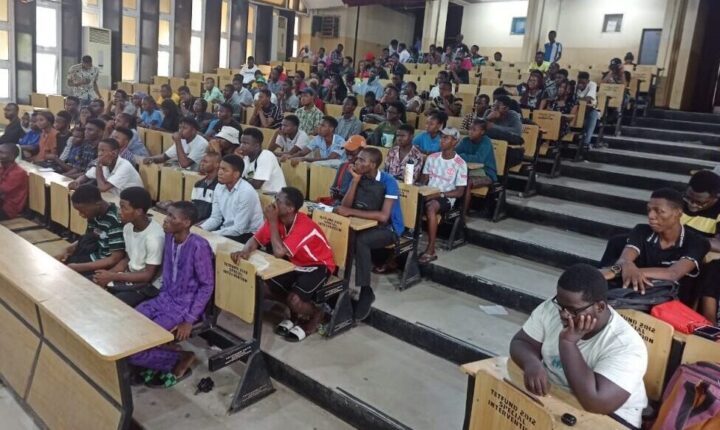File photo of Nigerian students in a university lecture hall
In a previous article, I advocated for the need for tertiary institution educators to get trained in teaching as a skill on its own, beyond their disciplinary expertise. In line with that, I advocated for the need for the establishment of Centres for Teaching and Learning in Universities and other Tertiary Institutions, which can provide necessary training and support for lecturers in their teaching and learning activities.
I have been imagining that someone may ask this question:
Why can’t lecturers simply find ways to get trained in education by themselves, like other educators in primary and secondary education are required to do? Why do we have to expend resources to create such centres across tertiary institutions in Nigeria?
Answering this question is the focus of this article. First, I must acknowledge the genuine concern of this question. Primary and secondary teachers in public schools are usually required to have some formal training in education, at least as a policy on paper. They are either expected to have some degree in education before they come into the workforce or get it while being in the workforce before a certain number of years. It could be a National Certificate of Examination, a Bachelor’s in Education or a Postgraduate Diploma in Education for people whose first degree did not focus on education. The only exception to this in Nigeria is seen in private schools, where schools simply work with the teachers they have and can afford. Of course, this has severely marred the quality of education in such spaces, but that is a conversation for another day.
Advertisement
If primary and secondary teachers face this kind of stringent requirement, it makes sense to question why lecturers do not face the same seeing they are also educators. It makes sense to question why I opine that the better way to train higher educators in the art of teaching is to create systems within their workplaces that can do that rather than requiring they do it themselves before getting into their workforce. There are several ways I can answer this question but for this article, I will focus on 2 reasons why I advocate for CTLs instead of higher educators getting trained in education by themselves:
• Lecturers already have stringent academic requirements
The minimum academic degree required to start a career in higher education is a Master’s degree. In fact, most schools require that aspirants must have started their doctorate work before they can be offered the position of Assistant Lecturer. Their bachelor’s and master’s degrees are also mostly required to be in the same/similar discipline they are planning to lecture. Unless every other discipline decides to include some courses in Education as electives for undergraduates who want to eventually teach in their discipline, there is no really no pathway for an intending Higher Educator to get any academic training in teaching. However, there is the possible option of having people start in a Discipline-themed Education (e.g., Physics Education) in their first degree, and end up in the core discipline itself (e.g., Physics) as a Lecturer. However, this option is currently not available in the Nigerian academic recruitment world. It is not even a conversation that Tertiary Institutions in Nigeria are ready to have yet. Another option is to require an Education Degree alongside the already required multiple discipline-based degrees for intending Higher Educators, and I want to believe you can also judge that this will not be a fair decision. It already takes a lot of time and resources to obtain the required discipline-based degrees. The limitations in the design of the academic profession pathway for higher educators make it difficult for them to have any formal training in Education before taking their jobs. This means the best way would be to inculcate education training into their jobs.
• Lecturers are not paid enough
Let us even say we are considering requiring Higher Educators to have some training in education by themselves before or within their jobs, the question will be: Are Higher Educators being paid enough to do that? Lecturers are already being paid so measly for what they do and what they are required to do. For example, academic promotions in most universities are heavily dependent on high-impact research publications. The same publications lecturers receive little to no institutional support to do. With lack of funding, weak infrastructure and more, many academics depend on personal funds to do research. That is, they must depend on the same paltry salary to do research so they can get promoted. Add the requirement of getting trained in education by themselves with their own resources to that and think of how it sounds. It does not make sense, right? Exactly.
Advertisement
• Rapidly changing times
The last reason is that things keep changing and the already over-burdened lecturer should not have the sole responsibility of keeping up with what is changing in the general world, in their disciplines specifically, and also in education and pedagogy models. Education Researchers are equipped to do that last part and they can provide support for higher educators via CTLs. It gives room for higher educators to be able to zoom in their focus into their respective fields, while still benefitting from an ever-growing understanding of teaching and learning within the rapidly changing world that can help them do right by their students.
Creating Centres for Teaching and Learning within Higher Education provides a great way to help everyone: both teachers and students. It is a win-win for all
Oluwatoyin is a Doctoral Researcher in STEM Education, Social Entrepreneur, and Policy Consultant. She writes from Boston, United States, & Lagos, Nigeria. She can be reached at [email protected]
Advertisement
Views expressed by contributors are strictly personal and not of TheCable.
Add a comment







